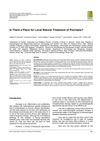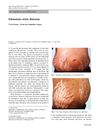 28 citations,
April 2008 in “Journal of Inclusion Phenomena and Macrocyclic Chemistry”
28 citations,
April 2008 in “Journal of Inclusion Phenomena and Macrocyclic Chemistry” Minoxidil mixed with β-cyclodextrin improves solubility and gradual release.
 26 citations,
December 2020 in “Nature metabolism”
26 citations,
December 2020 in “Nature metabolism” Rapamycin treatment helps with mitochondrial disease by reducing PKC levels.
 26 citations,
March 2007 in “Clinical and experimental dermatology”
26 citations,
March 2007 in “Clinical and experimental dermatology” Pimecrolimus cream is not effective for treating alopecia areata.
[object Object]  25 citations,
January 2000 in “Hormone Research in Paediatrics”
25 citations,
January 2000 in “Hormone Research in Paediatrics” Mutations in the androgen receptor gene cause Androgen Insensitivity Syndrome, affecting sexual development.
 22 citations,
August 2014 in “Clinical endocrinology”
22 citations,
August 2014 in “Clinical endocrinology” Taking finasteride for benign prostate hyperplasia may increase the risk of osteoporosis, especially at higher doses.
 19 citations,
August 2014 in “Journal of Ethnopharmacology”
19 citations,
August 2014 in “Journal of Ethnopharmacology” The study created a test that found hormonal and toxic effects in plant and fungal extracts using prostate cancer cells.
 19 citations,
June 2002 in “American Journal of Dermatopathology”
19 citations,
June 2002 in “American Journal of Dermatopathology” Apoptosis contributes to hair loss in androgenetic alopecia.
 18 citations,
August 2015 in “Biochemical and Biophysical Research Communications”
18 citations,
August 2015 in “Biochemical and Biophysical Research Communications” XEDAR triggers a specific signaling pathway in cells.
 17 citations,
May 2011 in “Gene Therapy”
17 citations,
May 2011 in “Gene Therapy” Using polyethylenimine-DNA to deliver the hTERT gene can stimulate hair growth and may be useful in treating hair loss, but there could be potential cancer risks.
[object Object]  16 citations,
March 2017 in “Journal of inclusion phenomena and macrocyclic chemistry”
16 citations,
March 2017 in “Journal of inclusion phenomena and macrocyclic chemistry” Minoxidil mixed with 2-hydroxypropyl-β-cyclodextrin in water can improve hair growth more than minoxidil alone.
 15 citations,
May 2018 in “Open Access Macedonian Journal of Medical Sciences”
15 citations,
May 2018 in “Open Access Macedonian Journal of Medical Sciences” Propolis and aloe vera ointment effectively treats mild to moderate psoriasis.
![Distribution of 1,25-Dihydroxyvitamin D3[22-Oxa] In Vivo Receptor Binding in Adult and Developing Skin](/images/research/d9b990e6-6243-4abe-b868-68801a5844f7/small/35023.jpg) 15 citations,
January 1995 in “Archives of dermatological research”
15 citations,
January 1995 in “Archives of dermatological research” OCT binds strongly to hair sheath cells and may affect skin and hair growth with fewer side effects than vitamin D3.
 14 citations,
March 2022 in “Journal of inflammation research”
14 citations,
March 2022 in “Journal of inflammation research” Baricitinib shows promise as a new treatment for certain skin conditions like alopecia areata.
 13 citations,
November 2019 in “Scientific reports”
13 citations,
November 2019 in “Scientific reports” Certain drugs change freshwater snail shells to a "banana" shape.
 13 citations,
August 2007 in “Bioorganic & medicinal chemistry letters”
13 citations,
August 2007 in “Bioorganic & medicinal chemistry letters” A new compound effectively inhibits human 5α-reductase 1.
 13 citations,
April 1994 in “Journal of Investigative Dermatology”
13 citations,
April 1994 in “Journal of Investigative Dermatology” Androgen receptors found in monkey scalps, similar to humans, affect hair growth.
 11 citations,
March 2019 in “EMBO molecular medicine”
11 citations,
March 2019 in “EMBO molecular medicine” A defective protein in progeria causes cell death and atherosclerosis, but a treatment targeting cell stress may reduce these effects.
 10 citations,
January 2023 in “Acta dermato-venereologica”
10 citations,
January 2023 in “Acta dermato-venereologica” Baricitinib and deuruxolitinib are effective for treating alopecia areata, but their efficacy depends on the dose.
 10 citations,
September 1997 in “Molecular carcinogenesis”
10 citations,
September 1997 in “Molecular carcinogenesis” Mirex seems to promote a unique group of skin cells different from those affected by another tumor promoter, TPA.
 9 citations,
August 2013 in “Archives of Dermatological Research”
9 citations,
August 2013 in “Archives of Dermatological Research” A gene called BMAL1 plays a role in controlling hair growth.
 8 citations,
February 1997 in “International journal of environmental analytical chemistry”
8 citations,
February 1997 in “International journal of environmental analytical chemistry” Most medicinal plants in Mexican folklore have safe element levels, but arsenic exceeds safe limits in almost all.
 7 citations,
January 2016 in “Laboratory Investigation”
7 citations,
January 2016 in “Laboratory Investigation” TR3 is mainly found in hair follicle stem cells and may be involved in hair loss.
 7 citations,
November 2014 in “Histochemistry and Cell Biology”
7 citations,
November 2014 in “Histochemistry and Cell Biology” The we/we wal/wal mice have defects in hair growth and skin layer formation, causing hair loss, useful for understanding alopecia.
 6 citations,
December 2013 in “Journal of Dermatological Science”
6 citations,
December 2013 in “Journal of Dermatological Science” Women with alopecia may have a higher chance of getting thyroid cancer.
 6 citations,
November 2008 in “Journal of Dermatological Science”
6 citations,
November 2008 in “Journal of Dermatological Science” Certain proteins involved in DNA modification may affect the genetic changes in systemic lupus erythematosus and could indicate the disease's activity.
 5 citations,
November 2020 in “Cells”
5 citations,
November 2020 in “Cells” Placental mesenchymal stem cells and their conditioned medium significantly improve healing in local radiation injuries.
 5 citations,
January 2017 in “Endocrinology”
5 citations,
January 2017 in “Endocrinology” Genetic defects in testosterone production can cause hormonal and developmental disorders, and more research is needed to understand androgen regulation and develop safer treatments.
 5 citations,
June 2012 in “The journal of investigative dermatology/Journal of investigative dermatology”
5 citations,
June 2012 in “The journal of investigative dermatology/Journal of investigative dermatology” Putting thymidine dinucleotide on newborn mice's skin can delay and reduce skin cancer.
 4 citations,
March 2014 in “The FASEB Journal”
4 citations,
March 2014 in “The FASEB Journal” The HIF-2α/ARNT complex is important for hair follicle development by controlling cell growth.
 3 citations,
April 2012 in “Internal and Emergency Medicine”
3 citations,
April 2012 in “Internal and Emergency Medicine” The girl's swelling and skin issues improved with fluid restriction and diuretics.












![Distribution of 1,25-Dihydroxyvitamin D3[22-Oxa] In Vivo Receptor Binding in Adult and Developing Skin](/images/research/d9b990e6-6243-4abe-b868-68801a5844f7/small/35023.jpg)

















